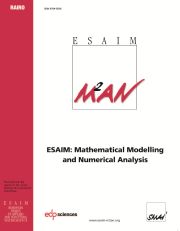Crossref Citations
This article has been cited by the following publications. This list is generated based on data provided by Crossref.
Nochetto, Ricardo H.
Walker, Shawn W.
and
Zhang, Wujun
2015.
Numerics for Liquid Crystals with Variable Degree of Orientation.
MRS Proceedings,
Vol. 1753,
Issue. ,
Tovkach, O. M.
Calderer, M. Carme
Golovaty, Dmitry
Lavrentovich, Oleg
and
Walkington, Noel J.
2016.
Electro-osmosis in nematic liquid crystals.
Physical Review E,
Vol. 94,
Issue. 1,
Zhang, Chiqun
Zhang, Xiaohan
Acharya, Amit
Golovaty, Dmitry
and
Walkington, Noel
2016.
A non-traditional view on the modeling of nematic disclination dynamics.
Quarterly of Applied Mathematics,
Vol. 75,
Issue. 2,
p.
309.
Calderer, M. Carme
Golovaty, Dmitry
Lavrentovich, Oleg
and
Walkington, Noel J.
2016.
Modeling of Nematic Electrolytes and Nonlinear Electroosmosis.
SIAM Journal on Applied Mathematics,
Vol. 76,
Issue. 6,
p.
2260.
Perrotti, Louis
Walkington, Noel J.
and
Wang, Daren
2017.
Numerical approximation of viscoelastic fluids.
ESAIM: Mathematical Modelling and Numerical Analysis,
Vol. 51,
Issue. 3,
p.
1119.
Nochetto, Ricardo H.
Walker, Shawn W.
and
Zhang, Wujun
2017.
A Finite Element Method for Nematic Liquid Crystals with Variable Degree of Orientation.
SIAM Journal on Numerical Analysis,
Vol. 55,
Issue. 3,
p.
1357.
Tovkach, O. M.
Conklin, Christopher
Calderer, M. Carme
Golovaty, Dmitry
Lavrentovich, Oleg D.
Viñals, Jorge
and
Walkington, Noel J.
2017.
Q-tensor model for electrokinetics in nematic liquid crystals.
Physical Review Fluids,
Vol. 2,
Issue. 5,
Ball, J. M.
2017.
Mathematics and liquid crystals.
Molecular Crystals and Liquid Crystals,
Vol. 647,
Issue. 1,
p.
1.
Nochetto, Ricardo H.
Walker, Shawn W.
and
Zhang, Wujun
2018.
The Ericksen model of liquid crystals with colloidal and electric effects.
Journal of Computational Physics,
Vol. 352,
Issue. ,
p.
568.
Emmrich, Etienne
and
Lasarzik, Robert
2018.
Existence of weak solutions to the Ericksen‐Leslie model for a general class of free energies.
Mathematical Methods in the Applied Sciences,
Vol. 41,
Issue. 16,
p.
6492.
Zhang, Chiqun
Acharya, Amit
Walkington, Noel J.
and
Lavrentovich, Oleg D.
2018.
Computational modelling of tactoid dynamics in chromonic liquid crystals.
Liquid Crystals,
Vol. 45,
Issue. 7,
p.
1084.
Gartland Jr., Eugene C.
2018.
SCALINGS AND LIMITS OF LANDAU-DE GENNES MODELS FOR LIQUID CRYSTALS: A COMMENT ON SOME RECENT ANALYTICAL PAPERS.
Mathematical Modelling and Analysis,
Vol. 23,
Issue. 3,
p.
414.
Lasarzik, Robert
2019.
Weak-strong uniqueness for measure-valued solutions to the Ericksen–Leslie model equipped with the Oseen–Frank free energy.
Journal of Mathematical Analysis and Applications,
Vol. 470,
Issue. 1,
p.
36.
Feng, Zhewen
Hong, Min-Chun
and
Mei, Yu
2020.
Convergence of the Ginzburg-Landau Approximation for the Ericksen-Leslie System.
SIAM Journal on Mathematical Analysis,
Vol. 52,
Issue. 1,
p.
481.
Carter, Sylver
Rotem, Amit
and
Walker, Shawn W.
2020.
A domain decomposition approach to accelerate simulations of structure preserving nematic liquid crystal models.
Journal of Non-Newtonian Fluid Mechanics,
Vol. 283,
Issue. ,
p.
104335.
Borthagaray, Juan Pablo
Nochetto, Ricardo H.
and
Walker, Shawn W.
2020.
A structure-preserving FEM for the uniaxially constrained $$\mathbf{Q}$$-tensor model of nematic liquid crystals.
Numerische Mathematik,
Vol. 145,
Issue. 4,
p.
837.
Kortum, Joshua
2020.
Concentration-cancellation in the Ericksen–Leslie model.
Calculus of Variations and Partial Differential Equations,
Vol. 59,
Issue. 6,
Baňas, Ľubomír
Lasarzik, Robert
and
Prohl, Andreas
2021.
Numerical analysis for nematic electrolytes.
IMA Journal of Numerical Analysis,
Vol. 41,
Issue. 3,
p.
2186.
Wang, Wei
Zhang, Lei
and
Zhang, Pingwen
2021.
Modelling and computation of liquid crystals.
Acta Numerica,
Vol. 30,
Issue. ,
p.
765.
Borthagaray, Juan Pablo
and
Walker, Shawn W.
2021.
Geometric Partial Differential Equations - Part II.
Vol. 22,
Issue. ,
p.
313.


